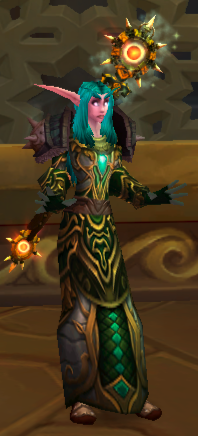
This is one of the tougher pieces I’ve written. I had to wrestle with my internal conscience about how to properly word it. I couldn’t think of anything else better than asshole. I’ll probably end up turning away a few readers as a result, but this is something that has to be written.
Every time we play WoW, we interact with various people. We interact with people in partys. We interact with players in trade chat or out in the world. And there is no place we interact more then in our own guild. Whether you care to admit it or not, most guilds have an asshole. I’m not talking about the jerk who likes to get on his fat mount and block the quest turn in guy. Or the jackass who likes to hop up and down on your fishing bobber.
No, the assholes I’m talking about represent a type of cancer in your guild. You might be aware of it but most of you might not be.
This post is intended to be a wakeup call.
Several years ago when I was just a sophomore Priest, I went into a raid instance called Blackwing Lair. Throughout those weeks, I battle hard through every aspect of the zone. I pulled off the suppression room, mopped the floor with Vaelastrasz, Broodlord, and Firemaw. Spent hours practicing and then defeating Chromaggus until I came upon Nefarian before he fell.
A piece of Transcendence dropped and I was in line for it next. It was awarded to me and the elated feeling that players received after killing a boss and getting upgrades swept over me. Then another healer in the group sent me a whisper.
“Grats on the robe. Nice to be in a guild that awards loot to undeserving players.”
The feelings of joy vanished in an instant. I went from feeling the best to feeling like complete crap.
The Two Tests
Dr. Robert Sutton came up with two tests to determine when a person is acting like an asshole.
- After talking to the alleged asshole, does the ““target” feel oppressed, humiliated, de-energized, or belittled by the person? In particular, does the target feel worse about him- or herself?
- Does the alleged asshole aim his crap at people who are less powerful rather than those who are more powerful?
While some assholes are fully capable of doing damage publicly through guild chat, forums or ventrilo in front of your guild, there are some who are able to do their dirty work in private and are much tougher to catch.
12 Common Everyday Actions that Assholes Use
I’ll bold the ones that I believe are possibly relevant to you and your guild. This list is right out of Sutton’s book as well.
- Personal insults
- Invading one’s personal territory
- Uninvited physical contact
- Threats and intimidation, both verbal and nonverbal
- Sarcastic jokes and teasing used as insult delivery systems
- Withering e-mail flames
- Status slaps intended to humiliate their victims
- Public shaming or status degradation rituals
- Rude interruptions
- Two-faced attacks
- Dirty looks
- Treating people as if they’re invisible
All of us have acted like assholes at one point or another. Some days we lose our cool. It happens. We just have to do a better job of trying to control. I’ve lost my temper before and I’ve said things that I regretted immediately.
But the certified guild asshole? He has a level of persistence around him. He has a history of the consistently results in one person after another feeling like crap. They feel humiliated. Disrespected. De-energized. Constricted. Suffocated. In the end, they just feel really bad about how they are.
In short, the certified asshole gets the title because they are always treating people like crap around them.
Do you realize that you spend 15 bucks a month to play WoW? Where does it say you have to spend those 15 bucks playing alongside assholes who do nothing but treat you like garbage everytime you’re on? You deserve a lot better than that. There have even been studies that have shown that interacting with assholes often can lead to physical health problems like anxiety, fatigue, anger and depression.
An asshole can have a serious negative effect in your guild because they suck the life and energy out of people through smaller and seemingly insignificant act as opposed to one or two flareups. Consider the officer who reminds a healer that “he sucks” at healing every chance he gets. Or continues to belittle them with questions like “Why are you so bad?” It’s annoying and its utterly stupid.
The human brain perceives negative interactions in a bigger way than positive interactions. Sutton states that negativity can have an effect that’s five times more powerful than a positive statement. It takes a lot of support from positive people to help counteract the energy drained by one asshole.
The No Asshole Rule
If only it were unnecessary for guilds to not need the no asshole rule. Its quite simple.
It is entirely possible to have a productive and constructive guild without resorting to destructive methods.
Set clear expectations and standards of your players. How they should act and how they should conduct themselves. The moment any one of them pushes the line or crosses it, you have to take action. If they treat people like dirt in a pickup group or master loot themselves a trinket in a run they organize, there is no place for such behavior.
You don’t have to be an asshole to get the message across to someone. It can be done critically and it can be done firmly. More importantly, it can be done in a civil fashion.
Enforce the rule or don’t have it at all
You know what’s worse then having an asshole in the guild? Not doing anything about it when the rules specifically state that such assholeish behavior isn’t allowed.
It ends up being nothing more then a paper tiger.
Why do guilds put up with it?
There’s a belief in that having negative outbursts are character flaws that become tolerated if people are talented, intelligent and harder to replace. Talent can justify guilds looting items to these douchebags and we end up sending this message:
If you’re really good at what you do, you can get away with being a really big asshole. Actually this isnt just limited to guilds as it applies anywhere you go, really. Whether its at work or at school, the philosophy appears to be the same.
If you display words about treating people with respect but allow or even encourage the opposite behavior, it becomes useless. You end up being seen as a hypocrite and as a cynic. Players will lose faith in you and in the guild itself. Assholes multiply. When players see a person acting like one and is left unchecked, they’ll give in to their own inner rage and start doing the same thing.
Either enforce the rule or don’t implement it at all.
Life is too short for you to work and play among assholes.
I do want to encourage you to pick up this book if you’re into management or leadership. Heck, even if you’re just looking for a good book to read. Maybe you’re a teacher or you work in an office. There’s a chapter on how to deal and cope with assholes. It’s called the The No Asshole Rule: Building a Civilized Workplace and Surviving One That Isn’t by Dr. Robert Sutton.



 Yes, he sure did. However, when we’re talking about a rerolled character or an alt, there are a lot of reasons for guild leaders to say no. For example, let’s take Sydera. She’s been all the way through TBC and the current Wrath content, and somewhere along the way, her operator learned a thing or two about healing on a druid. When I take my warlock out for questing, I’m less quick to react than I am on Syd. It’s like playing a stranger. I might be able to learn another healer, but I don’t think I’d ever post great numbers as a raiding warlock. For high-end raiding, the absolute optimum scenario is for everyone to play one class of their choice and to build the team based on those choices. Changing things up mid-stream is uncomfortable both for the leadership and for other players.
Yes, he sure did. However, when we’re talking about a rerolled character or an alt, there are a lot of reasons for guild leaders to say no. For example, let’s take Sydera. She’s been all the way through TBC and the current Wrath content, and somewhere along the way, her operator learned a thing or two about healing on a druid. When I take my warlock out for questing, I’m less quick to react than I am on Syd. It’s like playing a stranger. I might be able to learn another healer, but I don’t think I’d ever post great numbers as a raiding warlock. For high-end raiding, the absolute optimum scenario is for everyone to play one class of their choice and to build the team based on those choices. Changing things up mid-stream is uncomfortable both for the leadership and for other players.